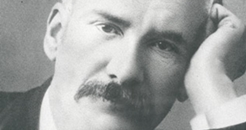 Boots the Chemist
Boots the Chemist
John Boot was born near Nottingham in 1815. He started out as an agricultural worker, became a Wesleyan lay preacher and was involved in the lace market area of Nottingham to help improve living conditions within his community. He became familiar with the fundamentals of medical botany and remedies published by John Wesley. In 1849, in a poor area of Nottingham and in partnership with his mother, he opened a herbal remedy shop offering consultations and products at prices that were affordable.
John died aged 45 in 1860, and his son, Jesse left school at 10 and helped his mother run the business. In his spare-time he studied pharmacy and in 1877 opened his first chemist shop. Under his management, the business expanded and he stayed true to the aim of providing affordable healthcare to the community with slogans such as “Health for a Shilling” by breaking the price-fixing policies of other chemists in the area. He purchased proprietary drugs in bulk and sold them at prices below the prevailing retail price. He also began small-scale manufacturing behind the main shop. He believed that his lower prices would enable the poor to buy goods that previously they could not afford.
At that time doctors made up their own prescriptions after diagnosing what was wrong with their patients. The cost of prescriptions were high and this often stopped the poor from receiving the medical help they needed. Boot decided to break this monopoly by employing a chemist, to provide prescriptions. On average the cost of these prescriptions were less than half those charged by the doctors. This was a great success and helped Boot expand his business.
In 1885 he met Florence, his future wife at a Wesleyan chapel in Jersey. She came from a family with a retailing background and together they turned Boots into a national retailer, which branded itself as "Chemists to the Nation". Between 1890 and 1914 Boots expanded from 10 stores in the East Midlands to over 500 stores across England, Scotland and Wales.
They were lifelong Methodists and introduced many innovations in the workplace. They included; employment of welfare professionals, a surgery to ensure the health of employees, a college to extend the academic and vocational education within their younger employees, provision of breakfast for staff and a profit sharing scheme.
The Boots were great benefactors to Nottingham and Jersey. It is believed they donated upwards of £2m at 1930 prices to charitable causes. They donated land in Nottingham for the new University College at Highfields, now the University of Nottingham, which opened in 1928. They also funded many of the buildings including the Great Hall, Lenton Hall (male student accomodation), Florence Boot Hall (female students), sports pavilion and grounds.
Jesse was knighted in 1909, sold the company in 1920 and became Baron Trent of Nottingham in 1929. He died in 1931 in Jersey after retiring there through ill-health in 1928. In 1933, Florence opened the 1,000th Boots shop in Galashiels.
Their son, John Boot, with others, bought Boots back In 1933 and as chairman, he expanded the business overseas. He saw the first shop in New Zealand open in 1936. He improved working conditions for staff by reducing the number of working hours and giving pensions for his employees. He also started 24-hour opening as “People cannot regulate their illness to fit in with definite times; prescriptions must be dispensed sometimes during Sundays and holidays.”
Retweet about this article:
Picture: Jesse Boot - © The Alliance Boots Archive & Museum Collection
Geoff Knott, 04/10/2016